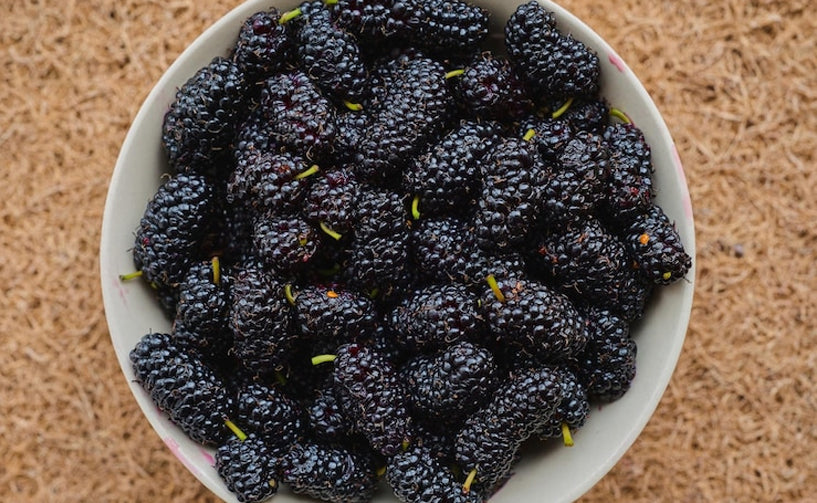Mulberry or Morus Alba is a small to medium sized fast growing plant with a short lifespan. It is a native plant of China and is now widely cultivated in Australia, Argentina, Afghanistan, Iran, and U.S. It is cultivated in India sub-continents to feed silk worms and for other commercial purposes.
Mulberry is widely grown in warm temperate regions and subcontinents of India, Iran, Afghanistan and China. It’s a well known edible and the ornamental plant and bears plentiful fruits. This plant has toothed leaves and bears black berry-like sweet juicy fruits. The leaves are food for silkworms and livestock. Fruits possess unique flavour and nutritional contents. Sherbets, wines, jam, and jellies are formed from the fruits of mulberry plant.
All parts of the mulberry plant contain medicinal properties. The plant has been used in traditional Chinese medicine for the purpose of treating constipation, premature grey hair, diabetes, oedema, cough, diuretic, wheezing, fever, headache, eye infections and other respiratory disorders and for purification of blood.
Mulberry contains many flavonoids and natural phenols that show significant anti-inflammatory, anti-cancer, anti-aging, anti-bacterial, and antioxidant properties. The leaves contain more flavonoids as compared to fruits and stems. Apart from this, it also possesses plenty of polyphenolic compounds, including apigenin, rutin, morin, luteolin, anthocyanins, resveratrol and oxyresveratrol, Isoquercitrin, chlorogenic acid, caffeic acid, umbelliferone, kuwanon G and sanggenon C, and gallic acid. Moracin provides anticancer, anti-inflammatory and antioxidant properties to mulberry.
Albanol A causes cytotoxicity in cancerous cells and albosteroid shows anti-ulcer antioxidant and anti-cancer activities. Mulberry is a dense source of iron, vitamin C, potassium, phosphorus, calcium, riboflavin and the dietary fibers.
The leaves are astringent, hypoglycaemic, ophthalmic, diaphoretic, anti-bacterial in nature and help in relieving problems of teeth, eye infection, mouth ulcers, sore throat, cold and flu.
The stem is diuretic, antispasmodic, antirheumatic and hypotensive in nature and the fruit has good tonic property.
Mulberry root bark works as antitussive, sedative, expectorant, diuretic and as an antiasthmatic agent.
Benefits of Mulberry
-
Strengthens Immune System: Alkaloids in mulberry stimulate or activate white blood cells that are related to the immune system and thus boost immunity. The rich content of vitamins C, B further contributes to stronger immune system.
-
Improves Heart Health: Mulberry improves cardiovascular health by decreasing fat accumulation, cholesterol, and blood pressure. Mulberry also prevents excess fat and obesity.
-
Helps in Diabetes: Mulberry improves insulin sensitivity, regulates insulin level and glucose tolerance in diabetic people. It can lower down blood glucose level and assist in prevention of diabetes.
-
Decreases Cancer Risk: It lowers down the risk of cancer due to the presence of morusin and Kuwanon, which prevent malignant cell growth and help in cell death or apoptosis of cancerous cells.
-
Reduces Fatigue: Mulberry can help to lower down excess tiredness or fatigue and anxiety.
-
Fights Depression: Mulberry root bark contain sanggenon C, which can help as an anti-depressant. Mulberry also helps to deal with stress due to its adaptogen activity.
-
Fights Anaemia: Mulberry increases the production of RBC. It also provides iron and vitamin C to the body and helps in fighting anaemia.
-
Anti-aging in Nature: Mulberry delays and prevents ageing.
- Inhibits Bacterial Infection: The antibacterial nature of root and bark inhibits bacterial infection, especially related to the oral health including gum inflammation and throat.
Natural food colour extracted from the mulberry fruits has a huge demand and commercial value. Its therapeutic value can be experienced by using Immunoblast Juice made by Preserva Wellness.






